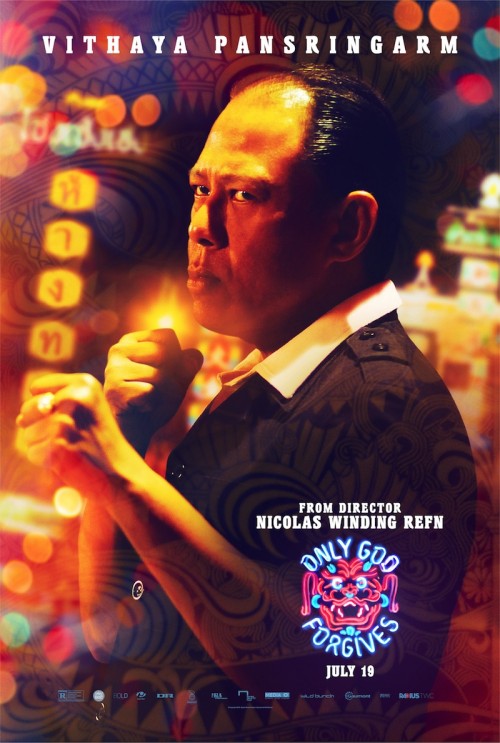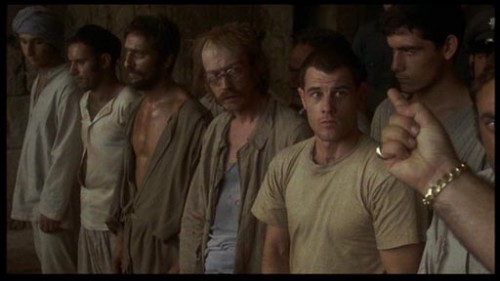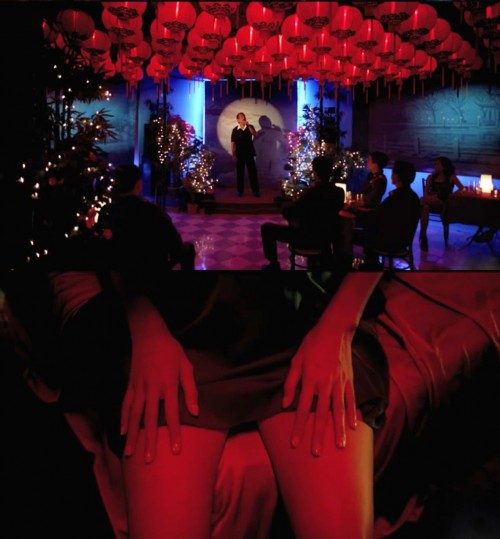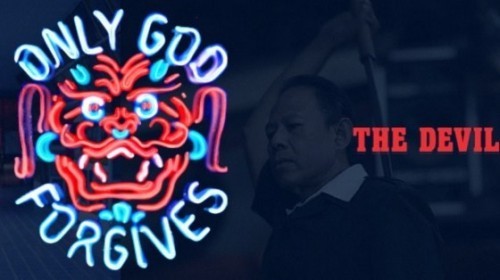Film
Only God Forgives ————– Extreme & Total Sexism
Only God Forgives, as A.D. Jameson’s excellent 25-Point Post claims, is a great pleasure to watch and to think and talk about. And in this post (which owes much to A.D’s) I want to talk a bit about how the movie deals and centers in Xenophobia, Racism and, by far most interestingly and vitally, Sexism.
The movie’s extreme Xenophobia and Racism are quite obvious and need little explanation outside of how they reinforce the more interesting and varied Sexism that controls and overwhelms this great movie.
The extreme Sexism that the movie traffics in and wields about quite beautifully and, to some extent, flagrantly, is, indeed, something of a complicated beast. And looking at a large slice of the female side of the coin of this movie one might believe that women are its soul, its dream, its ghostly pleasure-force and feel reassured that such captivating and transfiguring elements are able to maintain a kind of independent and alternative sort of power.
But, this would be wrong, because in its decisive moments and passages, the female’s mysterious and seemingly impenetrable masturbatory pleasure and dream-stage-lushness is turned and co-opted, by the male-God force of the movie, into sheer, show-stopping violence. (and, in fact, some of the dreamy staged females are men. How many? Half? Who knows?)
The most obvious “fight” or “war” staged in Only God Forgives is that of the sexes personified through Chang, Godlike Thai local, and Crystal, Julian’s Godlike, avenging monstrous mother. And this “fight” creates some tension, for a while, shaping up into a decent sort of contest–but after the botched hit (on Chang) Crystal admits that she has lost and all that’s left for her to do, really, is stand up against the window glass and take it in the throat.
Crystal—a real monster, caricatured, nasty, smart, powerful, unlikable and disgusting—is a decent foil for Chang, Thai Godlike Hero, and makes a splashy impact on us, the audience, by humiliating her son (like the hotel reception “girl”), and creeping us out with the way she touches him—insinuating quite unnatural abominations. And Julian, (the character one might expect to be the hero) is really just, as AD Jameson says, “a momma’s boy” who can’t measure up against the irresistible local God (Chang). He’s just in the movie I think to underscore a kind of Western weakness that submits, ultimately, to the Thai hero. (and of course he’s played by Ryan Gosling).
All the foreigners (Westerners) in this movie are bad/weak/evil. They are corrupting the local culture with their drugs, and abusing and sometimes killing the local women. And they need to be (and are) punished. When Julian surrenders to his destiny, the failed Westerner, it makes for a neat and inevitable ending. Like shoelaces being tied.
The less obvious but more interesting and crucial “fight” or “war” in this movie, though, involves what seems like solid female territory. Territory that the female seems to dominate, carving out and laying claim to a vital sort of rival energy, separate and inviolate, to the male violence. And this other fight that I’m talking about here takes place in the arena of “performance.” In fact the battle doesn’t just take place in the arena of “performance” it is a battle for “performance.” A battle for the shows of the movie.
The show of Mai masturbating, privately for Julian, and then, staged, in front of a live audience behind just a glow-beaded curtain; the lavish show and set in which the most savage and discomforting violence takes place (“the most harrowing scene in the film,” to use A.D. Jameson’s language), a dreamy, lush oasis: an alternate world in which the stars are the women. And the movie gains real tension and much of its power by way of these shows, these sorts of dreamy and trippy, masturbation-worlds which pretend and almost attain a kind of ghostly, ethereal and undefeated soul (of the movie) revolving around and centered in Mai, Julian’s paid love interest.
One might (and should) argue that these stages, these “sets,” are run and masterminded by men. But, then, again, one could retort that the soul of these stages, these sets, is still the women, the area between Mai’s legs, the look on Mai’s transfigured, blurred face (and more, in Mai, herself) and that this “soul” is able to float about vital and uncorrupted by the movie’s savage male forces.
And that would be nice. Yes, it would be nice to claim vagina dentata power for the female (per A.D. Jameson, again, here) but the blade is Chang’s and Mai just kind of fades out (they could have been more cruel about this, but that would have been a mistake) and the lush, incredible set where the harrowing torture scene takes place is filled with hidden knives that Chang can simply tiptoe among and pluck out quite whimsically, almost comically, and completely insidiously. The female landscapes and soul of the movie are, basically, just a harbor for male weaponry placed there and reclaimed as needed.
At the end of the day the performance and dream soul world of the movie doesn’t just get used by men it centers in and is constituted of and by men. The first time we see Chang singing on stage in front of his henchmen it’s kind of weird, creepy, discomfiting, but when this happens near the movie’s end it is a coronation and consummation, a post-coital sort of glow, stamp, seal and assertion (coitus here as the preceding ultra violence).
Our Godlike, Thai male, Chang, doesn’t just take over the female performance stages for his carefully choreographed shows of violence he also, in the aftermath, becomes a tender (and extremely creepy) singer performing to his rapt, transfixed henchmen. It is a total male victory. And it is extremely disturbing.
–
–
Tags: rauan movie review






hi, trans-women (“dreamy staged females”) aren’t “men”– they’re women.
you’re right
hmmmmm
pizzacato five and beyoncé have a baby in mini foamcore guggenheim
okay, now i’ll read the post
you’re right — I need to shorten up my posts, or just stick to my “dear rauan” column
I didn’t really see it as sexist, I saw it as a movie about a bunch of awful people of both genders. But I guess that’s just my male privilege…?
I hear ya. the movie is a bunch of awful people. and I think that by itself is a fair analysis. but, I think the male kind of wins in every single way and in one way that’s kind of surprising/interesting (in the female realm, performing)… regardless, it’s a strange, creepy and sometimes beautiful movie,…
Hi Rauan, everyone,
My overall reading of the film is that Julian’s family lives and dies by their own strength. They attempt to mete out what they consider justice, which is largely a form of filial loyalty. But they run up against a much more powerful force, Chang, which is truly supernatural/divine—something beyond human judgment. He is some version of morality incarnate. (I showed the film to
some friends, one of whom compared Chang to the Spectre.)
I don’t read Chrystal as a god. She is powerful, but hers is a human power, whereas Chang’s power is beyond the human.
The story, thus, is a redemptive one, as Julian achieves a rather “Jodorowskian” fate: he is freed from the false/corrupting influence of his family. By submitting to Chang’s
judgment/punishment, he is arguably cleansed of his misdeeds.
Mai opts out of Julian’s control, it would seem. But she then returns to the system that traps her (she remains an entertainer at the film’s end). She does seem to achieve some moral victory, though, however small.
hi A.D. and thanks for commenting here.. and, again, i very much appreciated yr 25 point review and used some of its elements as anchors for my own thinking– yr point number 11, regarding “performance,” was particularly helpful,… and (lovefest nausea alert!) at the end of the day, man, it seems like we both enjoyed the movie and thinking about it,…
best,
Rauan
You flatter me… I’m glad we both posted about the film. Perhaps we can turn the tide some, and get people to stop dismissing it out of hand. It’s a beautiful and fascinating film worthy of serious attention! A
P.S. I have further thoughts regarding that performance aspect of the film and am trying to distill them, make them cohere. I’m trying to think of other films that feature stationary groups of people observing another person moving/performing. Jacques Rivette has been on my mind as a result. I wonder if Refn picked it up there? He seems to have seen everything. And Rivette influenced Lynch, who influenced Refn… Still mulling it all over!
Being There? Seems like a…strange comparison, but its the first thing that came to mind (along with that scene in Club Silencio in Mulholland Drive, but you already mentioned Lynch).
no! no! no! i’m gong to like the post when i read it!
i really thought i was going to see this movie last weekend but then i didn’t and then i didn’t have time to read your post before i had to go to a dance recital and now i’m too tired
but i will read it and then probably i will like it
yes, i can be a slippery flatterer! and i look forward to more of your thoughts on performance, etc,… saludos!
Mimi– no worries, no worries, no worries… i was just trying to be funny, not upset or anything,… and, regardless, hope you get to see the movie soon… and let us know what ya think of it… it’s an odd-egg to say the least… best, Rauan….
Julian’s mom *is* Chang.
(Haven’t even seen the movie, but it’s totesobvs.)
Can’t wait to see this movie. Fuck Metacritic, I’m pretty sure this is a better film than the live-action Scooby Doo.
Enjoyed reading both Rauan’s and A.D.’s takes on the film. But I don’t think a movie can be sexist/not sexist. Only God Forgives depicts certain male/female rituals, power dynamics, performances, but this isn’t to say that the film endorses them. They are part of a world largely projected by Julian. And Julian is not the film, but rather of it.
I really like the idea, here, Nicholas, of the movie as a kind of Julian dream (nightmarish) or fantasy.. i’ll need to think more on this but as I sit and write now it seems to cover/account for everything,… thanks!! … Rauan,….
I tend to agree, Nicholas. I’ve seen more than a few critics calling Only God Forgives misogynist (e.g., Nick James in Sight & Sound), but I never understand what they mean by such a critique—because they never state its conditions. How, precisely, can a film be misogynist? I’m open to considering the argument, but the argument is then never made—it’s simply assumed.
Meanwhile, Hollywood remains a tremendously sexist, even misogynistic place. Women are rarely directors, and acting opportunities for women actors are unfairly limited. I totally understand criticizing that; I’ve made many such criticisms myself.
Yes, AD. There is this. Pure aesthetics, which makes ‘political’ analysis infinitely complicated.
https://www.youtube.com/watch?v=nJfYPiSe3Z0
tinyurl.com/l3cselt